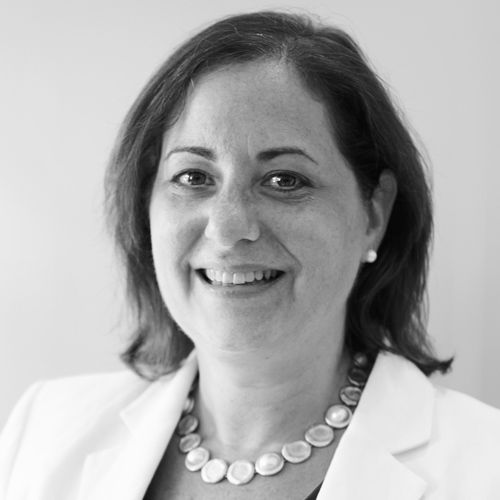Few fields generate more data than healthcare. Scientists researching breast cancer, for instance, can generate thirty thousand papers a month on new findings and existing treatments. It is humanly impossible to keep up with it all, let alone analyze and interpret it. But Watson can.
Ingrid Foerster, Watson Health Group’s intellectual property counsel, readily admits that she loves talking about the core technology she protects. She can’t help but discuss Watson’s natural language processing capabilities and its potential benefits.
“Watson is this scalable cognitive platform used in all types of domains,” Foerster says. “But it’s uniquely well-suited for healthcare because it’s able to ingest volumes of information in the form of content and data.”
Foerster calls Watson the perfect physician’s assistant. “Watson never tells the doctor what to do, but provides the latest research from around the world to the treating physician so that the patient is offered the best possible treatment options,” she says.
One of Foerster’s key roles is helping Watson Health get access to data and subject matter expertise to make the platform increasingly smarter and accurate. Technology has had a huge impact on the future and direction of healthcare.

This past November, for instance, IBM Watson Health and the Broad Institute of MIT and Harvard started a five-year, $50 million research project aimed at discovering the basis of cancer drug resistance. Anonymized data from the project will be made available to the scientific community to catalyze research worldwide.
In February, Jupiter Medical Center began using Watson to help oncologists deliver personalized, evidence-based cancer treatments. That same month, Watson Health Group announced plans to develop a cloud-based service designed to improve the physician-patient experience at Atrius Health, which serves 675,000 patients in eastern Massachusetts.
Watson should become more widely used in the future. In the wake of four acquisitions over the past two years, IBM’s health cloud now houses one of the largest and most diverse collections of health-related data in the world. It contains the aggregate health information of about three hundred million patients, an extensive cloud-based data set spanning hundreds of different types of costs, claims, quality, and outcomes information.
“I’m meeting with the developers of these acquired companies to help them understand how important their innovations are to IBM and how we can protect what they’re bringing to us,” Foerster says. “These acquisitions have no idea how valuable their IP is, and we have to help them understand that we can’t simply give it away.”
Foerster and Watson Health are also gaining data and expertise for the platform through partnerships with outside vendors. Foerster has been involved with many of those negotiations, which she says has been a lot of fun. “When I get to work with researchers and data scientists, my techie side comes out,” says Foerster, who earned a BSAA in electrical engineering at the Illinois Institute of Technology.
When she’s not in a lab studying the technology, Foerster works with internal clients to develop thoughtful strategies to protect it. The work involves invention mining and educating internal clients on IP laws, in addition to weighing different approaches when it comes to trademarks and copyrights.
The work isn’t easy, as the technology is constantly evolving; her vision must shift along with it. But few grasp how to get things done at IBM better than Foerster. While in college, she did some cooperative work as an engineer for IBM, which hired her on full-time in 1989. “I decided I wanted more breadth to the job,” Foerster says. “As an engineer, you can be incredibly focused on one piece of technology. I went to law school while I was working.”
Halfway through law school, IBM moved Foerster to the IP legal department in its storage group. The company eventually shifted her to the software side of its business. When the healthcare division was founded in 2015, she was the one who initiated her move.
“Overall, IBM makes a difference in people’s lives by providing convenience through technology, but this is even more than that,” she says. “I come from a family of doctors, so I have an interest in the medical field. It was a marriage of all my interests.”
Foerster says her job constantly keeps her engaged because of all the new ways healthcare entities want to use Watson. In a partnership with Medtronic, for instance, Watson will predict hypoglycemic episodes in diabetic patients nearly four hours ahead of time, preventing potentially devastating seizures.
While custom applications are breaking new ground, Watson Health is establishing what Foerster calls “off-the-shelf Watson systems” that physicians can subscribe to. The best example is Watson Oncology. Clinicians and analysts at Memorial Sloan Kettering are working with IBM to train the system to interpret cancer patients’ clinical information and identify individualized, evidence-based treatment options that leverage decades of experience and research.
“One thing my career at IBM has guaranteed is that my job changes and evolves as the company does,” Foerster explains. “I don’t know what tomorrow will bring, but I’m sure it will be exciting and challenging.”
Patterson + Sheridan, LLP is proud to have worked with Ingrid Foerster for many years in her capacity as IP counsel for IBM. Ingrid’s experience, guidance, and insight have served her and IBM well in ushering in a new era in cognitive computing. We proudly join in celebrating Ingrid’s many achievements!


